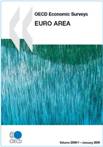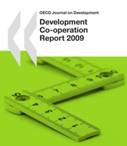The Organisation for Economic Co-operation and Development’s goals are to support sustainable economic growth, boost employment, raise living standards, maintain financial stability, assist other countries’ economic development, and contribute to growth in world trade.
 In support of its goals the OECD collects and publishes large amounts of economic data on countries. Many business and economics faculty and students already are familiar with the OECD economic surveys for countries and regions (copies in the 2nd-floor International Documents, OECD, collection at call no. OECD 10/). A title search in the Library Catalog for OECD economic surveys will display a list of the countries, and links are provided to see those that are available online.) But I never thought much about the “development” side of this organization’s name before.
In support of its goals the OECD collects and publishes large amounts of economic data on countries. Many business and economics faculty and students already are familiar with the OECD economic surveys for countries and regions (copies in the 2nd-floor International Documents, OECD, collection at call no. OECD 10/). A title search in the Library Catalog for OECD economic surveys will display a list of the countries, and links are provided to see those that are available online.) But I never thought much about the “development” side of this organization’s name before.
 The OECD’s Development Assistance Committee publishes an annual Development Co-operation Report. (Recent reports have also been the first issue of the OECD Journal on Development. Print copies, including 2009, are in the Library’s 2nd-floor International Documents, OECD, collection at call no. OECD 43/3/ and earlier years are also online via the ABI/Inform database). This report provides “data on, and analysis of, the latest trends in international aid.”
The OECD’s Development Assistance Committee publishes an annual Development Co-operation Report. (Recent reports have also been the first issue of the OECD Journal on Development. Print copies, including 2009, are in the Library’s 2nd-floor International Documents, OECD, collection at call no. OECD 43/3/ and earlier years are also online via the ABI/Inform database). This report provides “data on, and analysis of, the latest trends in international aid.”
It would be no surprise to read that it’s a tough climate for international aid right now. In fact, as it’s summed up in the 2009 report, “2008 was a year of crises: the food crisis, the fuel crisis and the financial crisis. These were all crises of globalisation; all were played out at the global level.” As countries grapple with these crises it is possible that the financial crisis may lead to an aid crisis as well. Furthermore, the 2009 report warns that increasing fragmentation (increasing numbers of donors and aid agencies) leads to inefficiencies, and a lack of focus and effectiveness. A recipient country may be dealing with numerous aid entities, and efforts may be wastefully duplicative, contradictory or even cancel each other out. Other issues exacerbated by this fragmentation are concentration of aid (which countries receive it) and control over how it is used.
There have been recent efforts to reform aid. Read the Paris Declaration on Aid Effectiveness (adopted 2005) and the Accra Agenda for Action (2008), which call for measures such as greater determination by recipient countries for how aid needs to be used to meet their goals.
 There are, of course, many articles, videos, and books on aid also. For example, the 2007 OECD Development Co-operation Report mentioned a book called The bottom billion: why the poorest countries are failing and what can be done about it (3rd-floor Main Collection, HC 79.P6 C634 2007). A search of the library catalog for the subject keyword “economic assistance” would display a list of subjects containing this phrase, from which you could choose to find books and government documents such as African development: making sense of the issues and actors (3rd-floor Main Collection HC800 .M6775 2007), Commission for Africa: recommendations for a coherent strategy for Africa: hearing before the Committee on Foreign Relations, United States Senate, One Hundred Ninth Congress, first session, May 17, 2005 (2nd-floor US Documents, Y 4.F 76/2:S.HRG.109-203), and Economic recovery in Africa: the role of the IMF (2nd-floor Browsing VHS HC800 .E28 1999).
There are, of course, many articles, videos, and books on aid also. For example, the 2007 OECD Development Co-operation Report mentioned a book called The bottom billion: why the poorest countries are failing and what can be done about it (3rd-floor Main Collection, HC 79.P6 C634 2007). A search of the library catalog for the subject keyword “economic assistance” would display a list of subjects containing this phrase, from which you could choose to find books and government documents such as African development: making sense of the issues and actors (3rd-floor Main Collection HC800 .M6775 2007), Commission for Africa: recommendations for a coherent strategy for Africa: hearing before the Committee on Foreign Relations, United States Senate, One Hundred Ninth Congress, first session, May 17, 2005 (2nd-floor US Documents, Y 4.F 76/2:S.HRG.109-203), and Economic recovery in Africa: the role of the IMF (2nd-floor Browsing VHS HC800 .E28 1999).
For assistance in finding these and related materials, please ask a librarian.

The University Library is a federal depository with many federal, state, local, and international documents on a variety of current and relevant issues available to you in print, microfiche, CD-ROM, and electronically. Come check out your government at the University Library!
